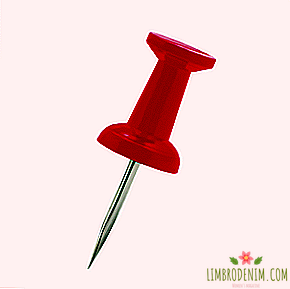Social entrepreneur Anastasia Gulyavina about favorite books
IN BACKGROUND "BOOK SHELF" we ask journalists, writers, scholars, curators, and anyone else not about their literary preferences and publications, which occupy an important place in their bookcase. Today, Anastasia Gulyavina, co-founder and program director of the platform for social entrepreneurs Impact Hub Moscow, shares her stories about favorite books.

My parents are from a science fiction generation. Mum was even scolded by her grandmother for constant reading and soaring in the clouds, it became some kind of family saying: “Here again you read, like your mother.” About the fact that my grandmother also likes to read, I found out three years ago when she went to the hospital with pneumonia and asked me to bring Dovlatov. Since then, I sometimes throw something to her. In the letters of the grandfather from the flight school, in addition to the characteristics of the aircraft, there is admiration for Balzac. I remember when I was very young, my mom and I went to work with dad. She took from him to read the Strugatsky - "Monday begins on Saturday," I also first of all rush to the shelves at a party. In general, I was never forced or taught to even read, but the books were so natural and not at all a sacred part of life that I don’t even remember myself without them.
I don’t remember the names of the characters, let alone quotes. I memorize books by sensations, like cities — smells, sounds, light. I live in them for a while. Therefore, it is difficult for me to read fiction, when there is a lot of work, when in real life all the senses need to be turned on at full capacity. I just do not have enough to recreate the sensations of the imaginary world, I am physically tired. Therefore, I read non-fiction. I just manage to exhale, slow down - I’m happy to return to novels and stories. Last winter, we spent two weeks in the mountains, I read the Odyssey out loud, I was listening to lectures on literature while cooking and almost cried from happiness — I suddenly remembered how much I loved fiction.
I read constantly, several books at the same time: something obliquely, another - avidly. As a rule, I read in Bookmate - precisely because of the speed. At home I have a whole closet of unread books waiting for their moment. And I keep buying. Most often, these are books brought from travels in English, which are unlikely to be translated into Russian soon. For example, stories from Morocco, Egypt, Saudi Arabia, Iran. Many of them are written by immigrant women. The easiest and stupid I give to a charity store, I left a couple for myself. Business literature for more than a year in paper form did not buy - precisely because there is no need to keep it for years, knowledge and concepts quickly become obsolete or develop.
I have never analyzed the influence of literature on my choice - it is a mutual process, it seems to me. That which is already responding will be read and reinforced in opinion. Sometimes I get interested in a certain topic and I read everything I find. For example, recently there was a period of studying the image of a French woman in self-help-literature. I wondered why I was interested in it: apparently, it just coincided with questions about my own identity - cultural and gender.
I almost do not listen to advice on the choice of books to read - the list is already too long, and I am not inclined to make the ratings of the authors, so I’m not afraid to miss someone “better”. Moreover, it annoys me very much when they persistently praise and say that I simply do not understand. Here, for example, Nabokov. I cannot perceive it at the level of physical sensations. I did not forget a single book as quickly as the Obscura. The only sure way to shove a couple of books to the top of the list is to be the person I really like and whom I want to understand. A couple of years ago, the Futurological Congress was read this way, and at the same time I found something to talk with my parents.
I love to read out loud. But I almost never read, because reading out loud is communication, it will not happen alone in an audiobook company. But it seems that none of my friends share this interest. Language, of course, is an important thing, but I have already said that I don’t remember specific words, so no matter how good they are, if you don’t open the entrance to Narnia, I can only get aesthetic pleasure. There are stories that the editor would not have prevented, but you can't tear yourself away - you were simply dragged into the world by the scruff of the neck and thrown there. These are the ones I love. Is the language good in the books I chose? I do not remember. Does everyone have their own world? What else.

Charlotte Bronte
"Jane Eyre"
The case when you open a book at thirty and suddenly you understand why you loved it so much twenty years ago. No, not romance, not heather heaths and not balls for that reason. It turns out that a damn woman has the right to make decisions and insist on justice - even if she is ten and is an orphan. She has the right to choose her job, to set conditions and not to compromise her own principles. It does not get worse if it starts all over again, even if it has to wander in the rain and eat porridge that was given to the pigs. A woman, after all, has the right to write a successful feminist novel in the middle of the nineteenth century. "Jane Eyre" - the only, perhaps, novel, in which an intelligent and independent girl can find a role model, the main desire of which would not be marriage.
Valery Panyushkin
"Invisible thing"
“I’m sitting in Coffeemania, sobbing - I just can’t tear myself away from the book and go to the office,” a colleague wrote to me in Watsapp, late for a meeting. The night before, I dragged to work a stack of books for filming and gave her the "Invisible Thing". The first and, probably, the most important text about charity as about love for me is the “Meeting”. About love, as in the epistle of the Apostle Paul to the Corinthians. This is about meaning. But the book has another role in my life - it was the first text, page by page, which asserts the right of social journalism to be cool. Not boring, not asking, not secondary, not boring. And one that does not let go of and sigh while you sit for a latte in Coffeemania. I love words, sense is vital to me, I am quite vain. It turned out that all this can somehow be combined. If the project management had not tightened me tightly, I would have ceased to fall into a stupor at the meeting with Panyushkin and asked for interns.
Nora Gal
"The word is living and dead"
My mother talked about mathematical formulas: “See how beautiful,” - unable to understand my sufferings. For a translator or editor, I have little attention, I slide off the letter, from the word into feeling too fast, but reading Nora Gal is for me - as for my mother to see interesting formulas. Order, simplicity, logic. “You write beautifully,” Facebook friends comment on each other, if someone described winter evening particularly flowery. No, guys, "beautiful" is not about the abundance of long words - it is about the harmony of the word with the reality into which it can transfer us. It is impossible to understand one picture of Kandinsky, what he was looking for in color and form, but at the exhibition, where a hundred works hang from early to the last, you understand: yes, here the triangle is yellow, and nothing else. "The Word is alive and dead" is a guide to the world exhibition of texts.
Heinrich Böll
"Billiards at half past nine"
My girlfriend considers the first lines of “A hundred years of loneliness” to be the most ingenious beginning of the novel, and I - “Billiards at half past nine”. In both, it is about several generations, but such a different rhythm. The chain of Aureliano Marquez versus one day in the life of the Femeles, which contained the story of dozens of years of both family and German society around the Second World War. All characters are written on a red card, which lies in the table by the secretary. Father, mother, son, daughter, Mr. Srell. At one end of the line - Robert Femel, at the other - the secretary. Between them - the reason for the call, a man whose name is not on the card.
It was summer, the very best and only August in life, when the school ended, enrollment happened and you owe nobody and nothing for the first time in your life, you don’t even have a summer reading list. I was sixteen, and for some Olympiad I was given Böll. So I began to wonder what was happening “from that side” in each case.
Michael Bulgakov
"Notes of the young doctor"
There are two types of "production novels", which I absorb in any form - whether the texts, serials, - about teachers and about doctors. If about doctors, then about specialists of a wide profile, working in the rural hinterland. But an unnecessary love line is surely inserted into the series, so “Dr. Queen, a female doctor” could not surpass Bulgakov.
"Notes" is such a dive into the depths: the space is limited, there are very few characters, around darkness and snow, from the sources of information only the library. Each patient can be considered a hypertext unit: here he appears in the waiting room, and behind him is a piece of reality that we have not seen before either because of darkness, or because of lack of experience. Of course, I didn’t think so when I repeatedly reread “Towel with a rooster” or “Egyptian Darkness”, but I’m unlikely to read again about the swollen eye and amputation, but to return to “the doctor” and learn more about despair, uncertainty, fear - for a person of any age is the most.
Simon Soloveitchik
"Last Book"
Simon Soloveychik invented the newspaper "The First of September," which my first editor loved, as a school newspaper. The cap read: "You are a brilliant teacher, you have wonderful students!" - and I really liked it. Like, you start whining - so you are a brilliant teacher, look for a way out. I began to read it from photographs of Yuri Rost, to which there were short signatures. Here with these signatures and the beginning. And retracted. When she came to work as a school counselor, Lyudmila Tikhonovna brought me a cardboard folder with a pack of newspapers - “The Last Book” came out gradually, just in the “First of September”.
I read a newspaper behind a newspaper, hooking on Soloveitchik’s first memories of how he came to work as a counselor at school. I thought that since he considers that time to be wonderful, then I am not a very loser. Then I studied in the second year of journalism at Moscow State University, wrote articles and believed that life, in general, was not successful: I have teenagers and reports, and someone has a magazine Yes !, where can I compare. But the man who created something more significant than the youth glossy magazine, page by page, remembered his way, thought out loud, calmed and fascinated.
Anton Makarenko
"Pedagogical poem"
Unnecessary books in the nineties were taken to the cottage. You can't hand over to waste paper, it's a pity to throw it out - it was not so easy to buy. Houses remained loved or beautiful, as in life. Children for the summer were taken to the same cottage as the books. There we met with Anton Semenovich when I was a teenager. And he became for me the first example of a teacher who takes on a hopeless cause, who admits his doubts and mistakes, who maintains faith in a person, whatever happens. It has become a kind of bar for me. Well, in general, a very fascinating story, if Dumbledore wrote about Hogwarts in the first person, something like that could come out, I think. And, and only ten years later, I learned that in the thirties, just on the wave of Makarenko's fascination, my own great-grandmother taught in the colony for juvenile delinquents.
Richard Feynman
"You are joking of course, Mr. Feynman!"
Feynman is a genius, a Nobel Prize winner, and that’s all. Charismatic handsome, yes. I do not really understand his theory, but I remember very well the feeling of reading the book: "Is it really possible, and I, too, have this right?" Is it really possible to learn how stupid and difficult, and in general “off topic” to things out of pure curiosity, for pleasure? Doesn't being a professional mean not being boring or being a snob? Is my desire to ask questions "why?" or "how does it work?" for any reason, not frivolity and pathology, but a characteristic of a person who I myself would really like? If your childhood was poisoned by the phrase "if you really want to do something, then do it seriously" - read Feynman immediately.
Maria Berkovich
"Nestra's world"
While traveling, I buy books by local authors about their cities / countries / culture, but in Russian books for the last five years I have been looking for books about “special” children. As a rule, they are in the "Pedagogy" section. The largest such section is, naturally, in the House of Pedagogical Books at the corner of the Kamergersky and Bolshaya Dmitrovka. There Yamburg was caught, the normal edition of Soloveichik and the first “special” book, which remains the best so far - the “Nestra's World”. Maria Berkovich - teacher-defectologist. The book is her diary, her notes. When a person has the gift of the word, but not the word is his main and favorite work, he does not have the time and desire to pose, to create an image. And the words go straight to the heart. From the "Unseemly World", by the way, I learned about Anton, who later became the hero of Lyubov Arkus's film "Anton is Near". I also really like cars verses. It seems that this is one of three or four books from which my bookmarks stick out.
Nikolai Kun
"Legends and Myths of Ancient Greece"
One of those books that appeared so early that I do not remember myself without it. Whose brother, who is from the gods on whose side, who Zeus turned into this time to seduce the earthly woman - all this was an endless series about beautiful and omnipotent creatures, explaining the structure of the world. Metaphorically, of course, but a set of emotions over thousands of years has not changed. Recently I discovered another beneficial effect of the knowledge of myths - in Munich we went to the Pinakothek, where the old masters, and I told my friend, what I was really talking about. Enough for the whole floor: here Apollo overtakes Daphne, and she asks for protection and turns into a laurel; Here Hera sends madness to Hercules, and he kills his own children. True, why they pierced Saint Sebastian with arrows, I read and forget once again, but this is another source.




